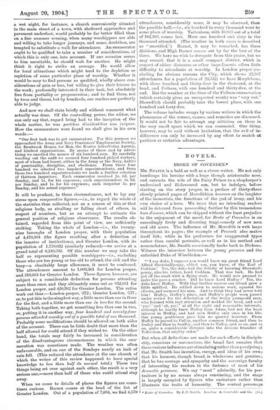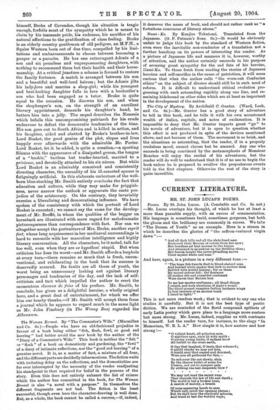and entrusts the role of the Fairy Prince to a
shopkeeper's undersized and ill-favoured son, but he indulges, before starting on the story proper, in a preface of thirty-three closely printed pages of Meredithian bravura on the laughter of the immortals, the functions of the god of irony, and his own choice of a hero. We trust that no intending readers will be deterred from proceeding further by this tremendous hors d'ceuvre, which can be skipped without the least prejudice to the enjoyment of the novel, for Broke of Covenden is an exceedingly lively and diverting tragi-comedy of new men and old acres. The influence of Mr. Meredith is writ large throughout its pages ; the example of .Peacock also makes itself felt; while in his preference for exaggerated types rather than careful portraits, as well as in his method and nomenclature, Mr. Snaith occasionally harks back to Dickens.
Witness the interview- between the young parvenu and the enfeebled Duke of Wimbledon
I say duke, I suppose you would know my great friend Lord. Alfred Shovehalfpeuny, eldest son, you know, of the Earl of Coddam.' Yes, the duke ilea the felicity of knowing Shovehalf- ry, also his father, Lord Coddam. That was luck. He had or off the mark with a flying start. Ho would now proceed to make the pace a cracker. Did he know Lord Huffey ? Yes the duke knew Huffey. With that further success our friend grew a little uplifted. He settled down to serious work, squared his elbows, and cornered his man. And to think they had never told him ! Huffey, Huffey's place, and Huffey's people were passed under review for the delectation of the weary young-old man, who listened with rapt attention and nodded his • head, and said yes ! ' and oh, yes !' at all the right and reasonable. intervals,. although he hardly knew Huffey from Adam, had not the least interest in Huffey, and had seen Huffey only once in his life. Our young gentleman gave him no quarter however. From Huffey he passed to Puffey, another common friend, and then to Duffey and then to Snuffey, and then to Tuffey, and so on, and so on, quite a considerable distance into the devious branches of . Toffeedom, that mighty order."
But when all deductions are made for such efforts in disciple- ship, conscious or unconscious, the broad fact remains that these various influences are stimulating rather than paralysing ; that Mr. Snaith has invention, energy, and ideas of his own ; that his humour, though. broad, is. wholesome and genuine ;• that he has courage and sympathy and the sovereign faculty
of interesting his readers in the fortunes of most of his dramatis personae. We say "most" advisedly, for his por- traiture is by no means always convincing, and the stage is largely occupied by figures who caricature rather than • illustrate the traits of humanity. The central personage
• Broke of Corenden. By J. C. Snaitla. London: A. Constable and Co. LCs.] himself, Broke of Covenden, though his situation is tragic enough, forfeits most of the sympathy which he is meant to claim by his insensate pride, his rudeness, his sacrifice of his natural affections to the gratification of class feeling. Broke is an elderly country gentleman of old pedigree, an M.P.H., a Squire Western born out of due time, compelled by his limi- tations and embarrassments to choose between becoming a pauper or a parasite. He has one extravagant Adonis of a son and six penniless and unprepossessing daughters, with nothing to recommend them but their health and their horse- manship. At a critical juncture a scheme is formed to restore the family fortunes. A match is arranged between his son and a beautiful and well-bred heiress ; but the Adonis jilts his lady-jove and marries a shop-girl; while his youngest and best-looking daughter falls in love with a bookseller's son who bad been engaged as a tutor. Broke is quite equal to the occasion. He disowns his son, and when the shopkeeper's son, on the strength of an excellent literary appointment, demands his daughter's hand, he batters him into a jelly. The sequel describes the Nemesis which befalls this uncompromising patriarch for his crude endeavour to defeat the democratic tendencies of the time. His son goes out to South Africa and is killed in action, and his daughter, aided and abetted by Broke's brother-in-law, Lord Bosket, the good genius of the plot, elopes and lives happily ever afterwards with the admirable Mr. Porter. Lord Bosket, let it be added, is quite a creation,—a sporting Silenus with the appearance of a dissipated groom, the tongue of a "bookie," tactless but tender-hearted, married to a Fres-louse, and devotedly attached to his six nieces. But while Lord Bosket is an admirably conceived and consistently diverting character, the unreality of his ill-assorted spouse is fatiguingly artificial. In this elaborate caricature of the well- born blue-stocking Mr. Snaith entirely overlooks the fact that education and culture, while they may make for priggish- ness, never narrow the outlook or aggravate the caste pre- judice of the aristocracy. On the contrary, they invariably exercise a liberalising and democratising influence. We have spoken of the consistency with which the portrait of Lord Bosket is executed ; we cannot say the same for the develop- ment of Mr. Breffit, in whom the qualities of the beggar on horseback are illustrated with more regard for melodramatic picturesqueness than correspondence with fact. Nor can we altogether accept the portraiture of Mrs. Broke, another esprit fort, whose long acquiescence in her mediaeval surroundings is hard to reconcile with her masculine intelligence and highly literary conversation. All the characters, be it noted, talk far too well, even when they are ex hypothesi stupid. But when criticism has done its worst—and Mr. Snaith affords a loophole at every turn—there remains so much that is fresh, uncon- ventional, and exhilarating in the book that its success is deservedly assured. Its faults are all those of youth, the worst being an unnecessary lashing out against literary personages and tendencies of the day, and the lack of self- criticism and tact which impelled the author to erect the momentous chesaux de fries of his preface. Mr. Snaith, to conclude, has given us a delightful heroine, a wholly original hero, and a great deal of entertainment, for which we offer him our hearty thanks,—if Mr. Snaith will accept them from a journal which he appears to regard much in the same light as Mr. John Finsbury (in The Wrong Box) regarded the Athenzunt.



































 Previous page
Previous page